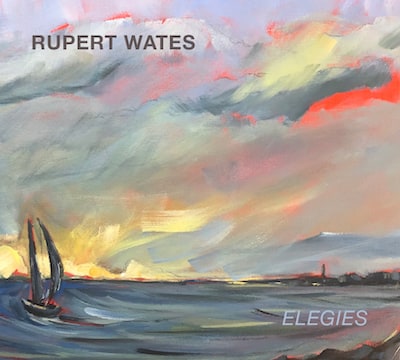Rupert Wates
Elegies
Bite Music
8 September 2023

A London-born but New York-based songwriter with a catch-in-the-throat vocal style, the songs on Rupert Wates‘ 12th album, Elegies, all concern themes of love and loss. With his Lowden acoustic accompanied only by Triton Dimitrov on double bass and recorded in a single day, some songs are loosely based on classical and Romantic texts, others of a more contemporary tone. His music, with his acclaimed fingerpicking style, variously conjures thoughts of Bert Jansch, Martin Carthy, Nick Drake, John Renbourn and John Martyn.
It opens with a perfect example of his fretwork on the ’60s coffee shop folk flavours of If I Ran To You, a sort of lyrical variation on Van Zandt’s If I Needed You (“If I ran to you would you lead me/All the way to your door…If I called your name would you feed me/All I needed and more“), shifting the musical mood with the more jazz-blues undercurrents of Guinevere, loosely inspired by Sir Thomas Malory’s La Morte D’Arthur, and sung as a conversation following Arthur’s death between her lover Lancelot, begging her to come with him to Brittany, and she protesting “Urge me not to break my sacred vow“.
Taking the tempo down with a circling fingerpicked anchor, the more ruminative The Storm takes its narrative inspiration from the writings of both Edgar Allen Poe and Samuel Taylor Coleridge, telling of a shipwreck with a storm suggestedly summoned up following the death of the narrator’s lover who revisits him as he drowns.
Staying with English poets, Keats is the inspiration for the darkling shades of Lady Of The Glades, the cold-hearted object of the narrator’s doomed infatuation clearly kin to La Belle Dame Sans Merci, the last of the literary nods coming with the stately melody of Across The Water, a familiar tale of suicide in the wake of being spurned (“As he rode by he never sought her/That very day a sailing ship/Was readied for the river’s daughter/they laid sweet flowers upon her brow/And they laid her feet towards the prow/At close of day they all stood by/As she set sail across the water“) derived from Alfred Lord Tennyson’s The Lady Of Shalott.
Warmer sentiments are to be found in the slow-waltzing Cathy (“She’s so very glad to see you/She smiles as you walk in the door/Family and friends lovers of yore/Cathy is happy to meet you/Cathy is happy to meet you“), though you might suspect Wuthering Heights played a part in its gestation.
One of two numbers dedicated to his wife and singing partner Stacey Lorin, the nimbly picked Martynesque (Like) Sunrise (which also has a call out to their dog Rosie) is a simple love song (“she fills my eyes/And she warms my face/Like sunrise“) as, indeed, is We’ll Go Dancing, a bittersweet memory of time in Paris (“though we have changed the rules of the game and little remains of the people we were/What we’ve lost has made us strong/And for the friends who now are gone/We will sing familiar song“), where you might detect echoes of Richard Thompson.
Though not strictly informed by any specific Romantic text, counted in the jazzy folk blues The Man Who Worked In Clay And Stone (a reference perhaps to Napoleonic era artist Antonio Canova, who initially worked his ideas out in clay before capturing them in marble) has a period conceit in describing how the narrator asks the artist to carve a model of his late lover in all her youth and beauty, only for the icy coldness of the stone to become a reminder of what he has lost.
A similar Romantic musing on mortality informs (On A) Midsummer Morning and, musically haunted by the spirit of Nick Drake, the feelings of youth that, breathing in the air and seeing the splendour of the sky, they will live forever, only for a cold breeze to remind that youth and beauty will eventually die. A couple of seasons later, just leaves the closing fretwork intricacies of Winter, another musing on mortality, but here, with the passing years bringing acceptance of the inevitable as he sings, “When all is done/Our hearts will be calmer my friend/For winter shall come to you and me/In the end“. Musically speaking, in its stripped-down nature, it doesn’t significantly depart from a basic framework, but the way he dances the notes within that are a testament to his consummate skills; the result is a hypnotic listening experience.
Order Elegies via Bandcamp: https://rupertwates.bandcamp.com/album/elegies-2
